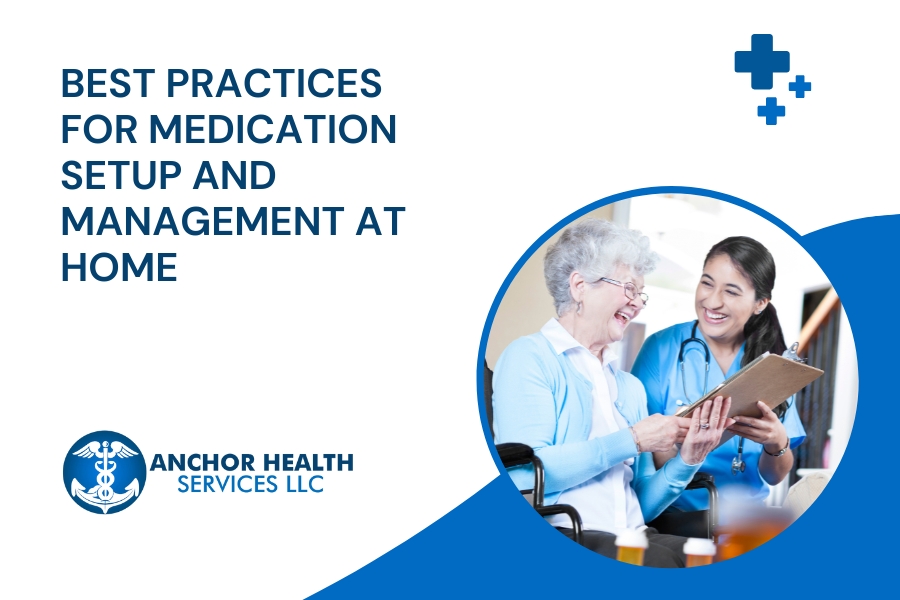For seniors managing multiple health conditions, keeping track of medications can be overwhelming. From remembering doses to avoiding dangerous drug interactions, medication setup and management are essential for maintaining good health. For many seniors, the support of caregivers and home health aides is crucial to ensuring medications are taken safely and effectively.
In this blog, we will explore the best practices for medication setup and management at home, including tips for organizing medications, preventing errors, and the role of caregivers in maintaining a healthy routine.
The Importance of Proper Medication Management
Many seniors take multiple medications each day to manage chronic health conditions such as diabetes, heart disease, and arthritis. Medication management involves the safe and timely administration of these drugs to ensure they are taken as prescribed. Without proper management, seniors may face serious health risks, including:
- Missing doses or taking medications at the wrong time
- Overdosing or underdosing
- Drug interactions that could cause harmful side effects
- Increased risk of hospitalization due to medication errors
Implementing a structured medication management plan at home helps seniors avoid these risks, leading to better health outcomes and improved quality of life.
Best Practices for Medication Setup at Home
- Create a Medication Schedule
One of the most effective ways to manage medications is by creating a clear, organized schedule. A medication schedule should include the name of each medication, the dosage, the time it should be taken, and any specific instructions (such as taking it with food or avoiding certain activities). By having this schedule readily available, seniors and their caregivers can ensure that medications are taken on time and as prescribed.
- Use a Pill Organizer
A pill organizer can be a valuable tool for seniors managing multiple medications. These organizers have compartments for each day of the week, and sometimes for different times of the day (morning, afternoon, and evening). Caregivers can fill the pill organizer at the start of the week, ensuring that medications are pre-sorted and easy to access. This method helps prevent errors and allows seniors to stay on top of their medication regimen.
- Set Up Medication Reminders
For seniors who have difficulty remembering when to take their medications, setting up reminders is essential. This could be as simple as setting alarms on a phone or using a dedicated medication reminder app. Caregivers can also assist by offering verbal reminders throughout the day, ensuring that medications are not missed.
- Keep an Updated Medication List
An updated medication list is critical for ensuring that all healthcare providers are aware of the medications a senior is taking. This list should include the name of each medication, dosage, frequency, and the prescribing physician’s contact information. Having this information readily available helps prevent drug interactions and ensures that healthcare providers can make informed decisions about treatment.
- Regular Medication Reviews
Regular medication reviews with a healthcare provider are important, especially for seniors taking multiple medications. During these reviews, doctors can assess whether the current medications are still necessary or if adjustments are needed. These reviews also provide an opportunity to discuss potential side effects or concerns about drug interactions.
The Role of Caregivers in Medication Management
Caregivers play a vital role in helping seniors manage their medications effectively. From setting up pill organizers to offering reminders, caregivers provide the support needed to ensure that medications are taken correctly. In many cases, caregivers assist with medication setup and management by:
- Organizing medications into daily or weekly pill organizers
- Offering reminders to take medications on time
- Monitoring for potential side effects or adverse reactions
- Communicating with healthcare providers to update medication lists or report concerns
For seniors with cognitive impairments or physical limitations, caregivers ensure that medications are administered safely and consistently, reducing the risk of errors and hospitalizations.
Preventing Medication Errors
Medication errors can have serious consequences, especially for seniors with chronic conditions. By following best practices for medication management, caregivers can help prevent common mistakes such as:
- Double Dosing: Taking two doses of the same medication, especially if the senior forgets they already took it.
- Skipping Doses: Forgetting to take a dose, could worsen a medical condition or lead to complications.
- Wrong Medications: Confusing one medication for another, particularly if the pills look similar or have similar names.
- Food and Drug Interactions: Some medications must be taken with food, while others should be avoided with certain types of food or beverages (such as grapefruit juice).
Caregivers are trained to prevent these errors by organizing medications, setting reminders, and monitoring the senior’s response to their medication regimen. Additionally, caregivers can work closely with healthcare providers to adjust medications as needed, ensuring that the senior’s treatment plan remains effective.
For professional assistance with medication setup and management at home, Anchor Health Services provides personalized care to help seniors stay on top of their medications safely and effectively. Our caregivers are experienced in managing complex medication regimens and ensuring seniors receive the support they need to maintain their health. Contact us today to learn more about our medication management services.


